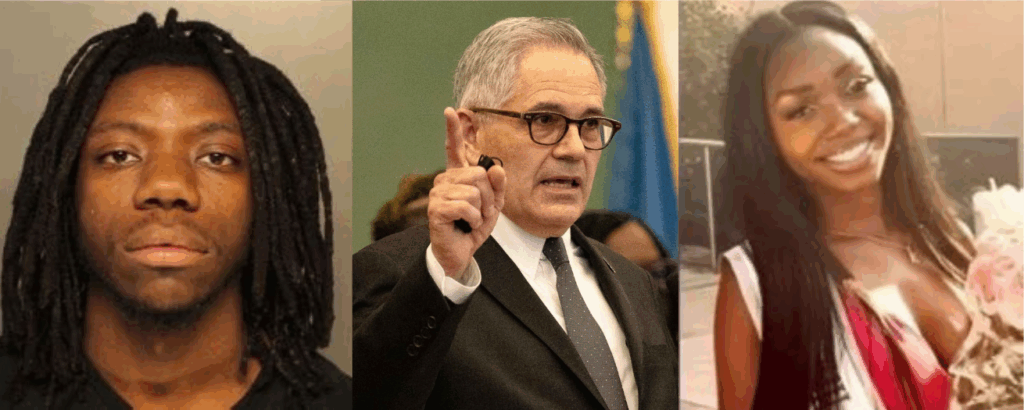Philadelphia’s “progressive prosecution” model was sold as a moral upgrade: fewer incarcerations, more diversion, a justice system finally gentle enough to heal. For years, District Attorney Larry Krasner held it up as proof that compassion could coexist with public safety. Then the Kada Scott case reminded the city that compassion without capacity is just negligence wearing a smile.
The Case That Broke the Slogan
Kada Scott, 23, vanished on October 8 after leaving work at a Philadelphia assisted-living center. A week later police confirmed that human remains found behind an abandoned school were hers. The suspect, 21-year-old Keon King, was already on the local justice system’s radar. He had been charged earlier this year in a kidnapping case but was released on a modest bail package after the victim didn’t appear at a hearing. Now he’s in custody again, charged with Scott’s murder, his bail set at $2.5 million.
No one alleges that the DA’s office wanted this outcome. But the sequence—from early release to repeat violence—is precisely what critics warned about when Krasner dismantled cash-bail norms and prioritized pre-trial freedom over containment. When “innocent until proven guilty” becomes “free until proven dangerous,” tragedies stop being outliers and start being audit points.
The Ideology of Mercy
Krasner’s reforms were built on genuine grievances. Philadelphia once jailed more people per capita than any large city in America; poor defendants sat for months on minor charges because they couldn’t post bail. In 2018, he announced the office would stop seeking cash bail for a long list of offenses and redirect resources toward rehabilitation. For a while, crime metrics cooperated. Then the pandemic, court backlogs, and a national wave of decarceration turned a controlled experiment into a stress test.
According to Philadelphia court statistics, violent-crime defendants released pre-trial increased from 6 percent in 2017 to nearly 14 percent by 2023. The DA’s office insists that overall re-arrest rates remain low, but the optics are devastating: every headline case is a moral referendum on reform itself. In politics, averages don’t matter when individual failures have faces.
The Bureaucratic Defense
At his press conference, Krasner acknowledged that his office “could have done better” but argued that the courts, the legislature, and systemic poverty share the blame. He’s not wrong; he’s just incomplete. Systems theory doesn’t comfort the public when one name keeps recurring on both sides of the courtroom docket. The promise of progressive prosecution was accountability with empathy, not empathy without accountability.
The Campaign Problem
Krasner faces re-election in November. Opponent Pat Dugan calls the Scott case “a textbook example of ideology over safety.” For voters, it’s less textbook than déjà vu. Each time a defendant released under reform-era policies reoffends, the city relives the same argument: Is this an acceptable cost of compassion, or proof that compassion has limits? The more often it happens, the less theoretical the question becomes.
Even fellow Democrats have started hedging. City council members now speak of “balance” and “review.” Translation: political oxygen is thinning. Reform fatigue has arrived—not because voters have turned punitive, but because they’ve grown allergic to euphemism.
When Metrics Replace Judgement
The tragedy highlights a larger flaw in data-driven justice. Algorithms and dashboards can track outcomes, but they can’t feel dread. Risk-assessment tools predicted that lowering bail for non-violent offenses would not endanger the public. Technically, they were right; statistically, most defendants do appear for trial. But for every Keon King who slips through, one family becomes the exception that rewrites the rule. To the victims, the aggregate success rate is just math over a grave.
The Ideological Trap
Krasner’s defenders argue that no system prevents all tragedy. True. But the reform movement has made perfection its marketing claim—if only we humanized the accused, justice would humanize itself. The Scott case exposes how brittle that optimism becomes in contact with reality. “Restorative justice” sounds noble until there’s someone who can’t be restored.
Philadelphia didn’t need a DA who believed in punishment for punishment’s sake. It needed one who understood that restraint is also mercy—the kind owed to potential victims. The city now has the opposite: a moral philosophy so committed to redemption that it forgets prevention.
What Comes Next
Krasner’s office promises an internal review and points to bail judges as co-authors of the disaster. The courts will cite statutory limits. Legislators will hold hearings. Each institution will find just enough plausible deniability to survive the election. That, too, is a form of bail—political, not monetary.
The Scott case won’t end reform. But it may finally end the illusion that compassion scales indefinitely. When ideology meets gravity, gravity wins.
Citations
- Associated Press – “Remains found in Philadelphia confirmed as missing woman Kada Scott” (Oct 20 2025)
- Newsweek – “Philadelphia DA Larry Krasner under fire after Kada Scott remains found” (Oct 21 2025)
- Philadelphia Magazine – “Kada Scott Case Becomes Flashpoint in DA Race” (Oct 22 2025)
- Philadelphia Courts Annual Statistics Report 2023 (2023)
- Philadelphia District Attorney’s Office – “Bail Policy and Reform Overview” (Accessed Oct 2025)

